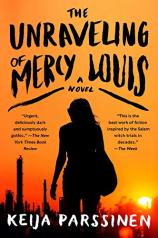Reading Group Guide
Discussion Questions
The Unraveling of Mercy Louis

1. Maw Maw is a profound force in Mercy’s life. In what ways does she benefit or suffer because of it?
2. Why does Maw Maw withhold physical affection? How does this effect Mercy?
3. What additional emotional and social complexity exists in the story with the State Semi-Final game loss as a backdrop?
4. Early in the novel Mercy claims that she’s not obsessed with training and winning, merely focused on them. What’s the difference? When does focus become unhealthy obsession?
5. Annie believes she deserves physical pain from her boyfriend’s abuse or even self-harm. Mercy gets “a rush from…pure pain” when training. What’s the role of physical pain in each case? What’s a healthy understanding of or relationship to physical pain?
6. Sonic roller-skate waitress Katie Dirks, after getting heckled in a suggestive way, boldly says to Illa: “you’d think being a girl was a…crime.” In what ways are the girls and women of Port Sabine made to feel criminal? What forces allow or create such treatment?
7. Early on Mercy celebrates that playing a sport at a high level is a balance of control and chaos. Later, she sees it as balancing control and freedom. In what ways are these ideas true? What’s the difference between chaos and freedom?
8. The human body is presented variously throughout the novel as an engineering marvel, a beauty to behold, the source of desire, a great danger, and extremely vulnerable. What does each character reveal in their relationship to their own body?
9. Maw Maw’s many frightening stories --- The Loup Garou, les feux follets, etc. --- are intended to help Mercy. Is fear an effective teacher of children? Can it do harm? What role does it play in controlling adult behavior?
10. When and how should life’s difficulties be presented to or hidden from children?
11. Examine the central character of Illa. What does she bring to the novel?
12. The narrator alternates chapter by chapter from Mercy’s first-person point of view to a third-person telling of Illa. What are the various effects of such shifts?
13. What does Travis Salter bring to Mercy and the novel?
14. Consider the many allusions in the novel, particularly the poem by Longfellow. What ideas do they introduce? What’s valuable about literature for Mercy and Travis?
15. Charmaine’s letters play a central role in the novel. What are their many effects?
16. When Mercy meets Travis’ mother and watches them interact, she thinks: “How good it must feel to be known.” What might this mean?
17. Shame is a profound force in Port Sabine and throughout the novel. Is there a proper or necessary place for shaming in society? What are its dangers?
18. Despite her awareness that love “all seems so painful,” after a first kiss Illa vows not to reach the end with “an unmarked heart.” Why must love involve so much pain?
19. Illa reaches the profound realization that “in the end, all that really mattered was whether or not you had a person who loved you when you were young.” What various and powerful results come from such experience or its lack?
20. With all Mercy’s talent and experience with basketball, it turns out to be swimming that helps her heal. Examine this. What’s different about the two activities? What might such a simple, meditative physical activity supply that medication or therapy don’t?
The Unraveling of Mercy Louis
- Publication Date: January 26, 2016
- Genres: Fiction, Psychological Suspense, Psychological Thriller, Suspense, Thriller
- Paperback: 352 pages
- Publisher: Harper Perennial
- ISBN-10: 0062319108
- ISBN-13: 9780062319104








